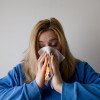Are there microplastics in the fish we eat?
Question
Are there microplastics in the fish we eat?
Answer
史蒂文打电话给问如果有塑料微粒in the fish we eat. Chris Smith put this question to ecologist Danni Green from Anglia Ruskin University...
Danni - Thanks for your question Steve. Short answer is yes. There's been quite a lot of evidence finding microplastics in fish that we eat and also in bivalves animals that we eat whole because quite often the microplastics are in the guts of the animals. But actually, we found microplastics in honey, beer, tap water, bottled drinking water, pop drinks, it's in our food yeah.
Chris - Why does it matter though? I guess is that is that what what you're worried about Steve? The fact that if we're eating it we're getting a diet of plastic but does that matter.
Steven - Well, to be honest with you, I watched the programme on BBC about the plastics in the ocean where they said there were 55 trillion pieces of plastic there. So I did a bit of research myself trying to find out everything about it. Within an hour, what I found was quite horrific with oestrogen being one of the main things that was being released into the oceans, when that gets in the food chain, it's going to affect the male population as well as the female population if it's not already been doing it for the last 20, 30 years or so.
Chris - Danni.
Danni - So there is some evidence that microplastics can absorb these other persistent organic pollutants. But the evidence is inconclusive actually, because some studies have found that they can absorb these things from the water column and they keep hold of them and then they get pooped out the other end and actually stop the animal from absorbing them into their own body. And other studies have found the opposite that they release them. And given that very recently there's been evidence that microplastics are in human poo, researchers in Austria, I mean it's a preliminary study it's not a published piece of work yet so take it with a pinch of salt,
Chris - Or a pinch of plastic even!
Danni - Yes a pinch of microplastic, but it's very likely that we are eating and inhaling microplastics so we definitely need more research to find out about these other effects.
Chris - Laura, what about the point that Steve makes about oestrogens and things about these female hormones that are in water that might be picked up by these plastics and then get into our bodies. Is there evidence for that sort of phenomenon?
Laura - Yeah there is evidence out there that that is occurring, and there are higher levels of oestrogen within our waters.
Chris - Does that make a difference?
Laura - It does make a difference because it's impacting on the male factor and it's actually then leading on to reductions in sperm because its effect in testosterone production as well. So it's something that we need to be aware of.
Chris - There's evidence that some aquatic animals are also being impacted isn't there? I mean we've seen fish changing sex and so on is that through this phenomenon?
Laura - Yes that's the phenomenon, not linked to micro plastics directly but linked to the east during the water. Nonetheless from the contraceptive pill. Yeah. So fish seals so marine mammals as well and other invertebrates too.
Chris - Danni, are scientists actively monitoring this and do they have any solutions, because I know we know that there are plastics in the ocean, it's one thing to say they're there, it's another to actually do something about it. Can we remedy this?
Danni - I think in terms of trying to remove microplastics, I think it's going to be very difficult because most of them sink, so 98 percent of them sink to the benthos, to the sea floor. And obviously if you're trying to dredge them out you’re going to cause more damage than good. In terms of trying to remedy the situation, I think prevention is better than cure in this case. We need to stop putting it into the oceans. Yeah. We need to switch to safer plastics as well so BPA free which a lot of actually a lot of drinks companies have already done.







Comments
Add a comment